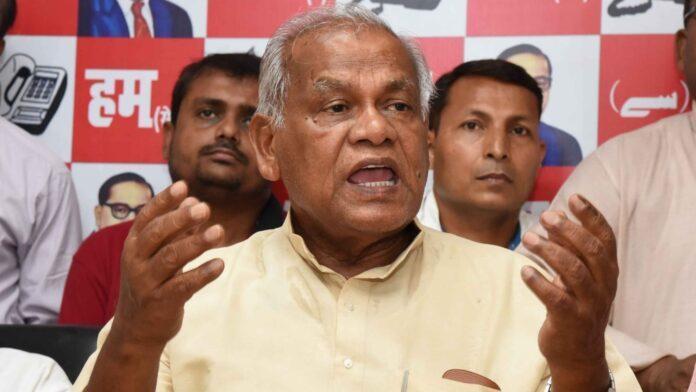Bihar: BJP’s Dalit Ally HAM Threatens to Take to Streets if ‘Creamy Layer’ Not Enacted

HAM leader Jitan Ram Manjhi (File Photo)
Patna: In Bihar, the ruling National Democratic Alliance (NDA) is not only divided on the Supreme Court’s verdict on sub-categorisation of Schedule Castes (SC) and Schedule Tribes (ST), but a BJP ally is also threatening to take to the streets.
Hindustani Awam Morcha (HAM) founder-chief and Union Minister Jitan Ram Manjhi, a vocal supporter of ‘creamy layer’ in SC/ST reservations, has threatened protest on the streets if the state government, led by Nitish Kumar, did not implement it immediately in the state.
Manjhi appears to be only Dalit leader in favour of sub- categorisation of SC/ST. But a big question is, why is Manjhi so aggressive on this issue, even warning to ‘expose’ his own NDA government in Bihar in case it fails to implement apex court’s decision on ‘creamy layer’ reservations.
Political analysts here feel that Manji’s stance appears to be a part of well-thought-out political strategy to widen his social support base among different Dalit castes, whom he describes as “vanchit” or deprived,
Recently, Manjhi repeatedly highlighted that only four dominant and prosperous castes among Dalits -- Dusadh (Paswan), Chamar (Ravidas), Dhobi and Pasi -- had benefited from reservation in the past 78 years, as they had snatched 95% of jobs and other facilities, while 18 poor and marginalised Dalit castes failed to get benefits of reservation till date.
“How many IAS, IPS, chief engineers, Class I officers
are from these deprived and backward Dalit castes?” Manjhi had said while targeting those opposing the apex court verdict on sub-categorisation of SC and ST reservations.
Manjhi is right, as most Dalit castes (18 out of 22) so far could not get a proportionate share in government jobs, as per reservations, and in government-run educational institutions. Their numbers in government jobs is almost invisible. Take, for instance, Manjhi’s own caste, Mushahar, considered as poorest among the poor. The poverty level is highest among the Mushahar community, known as one of India's most marginalised in the caste hierarchy.
According to the socio-economic data of the Bihar caste survey report, which was made public in
November last year, Mushahar population is 3.8% but only 0.26 are in government jobs. While other Dalit castes’ population is 3.48% but their presence in government jobs is non-existent.
As per the same report, the population of Dhobis is 0.83% but their share in government jobs is 3.4%, Pasi
population is 0.98% and share in government jobs is 2%. Dusaddh or Paswan is 5.31% and their share in government jobs is 1.44%. Similarly, the population of Chamar or Ravidas is 5.25% and their share in government jobs is 1.20%.
In a bid to mobilise deprived Dalit castes, Manjhi held a meeting on August 20 here under the banner of Vanchit Anusuchit Jati-Janjati Morcha, with representatives of these 18 Dalit castes
including Mushahar, Bhuiyan, Dom, Mehtar, Nut, Ghasia, Turi, Rajwar, Kanjar and others , who have not benefited from reservation, and urged them to get ready to fight for their rights.
The Union minister reportedly warned the state government that poor Dalits would be forced to stage protests on the streets and would hold a rally in Patna if the Supreme Court’s verdict in favour of sub- categorisation of SC and ST not implemented.
Manjhi demanded that the state government provide 10% reservation in jobs, education and in other facilities to 18 Dalit castes, which constitute 10% population of the state.
A former chief minister and a Dalit leader, Manjhi has been publicly supporting the apex court’s verdict, unlike other BJP allies, including Nitish Kumar’s Janata Dal-United and Lok Jan Shakti Party (Ramvilas) chief Chirag Paswan, who are opposing it. Chirag Paswan, a Union Minister from the Dusadh or Paswan, a militant Dalit caste, said that reservation was given to Dalits on the basis of untouchability, not educational and economic status. There is no basis to apply the ‘creamy layer’ factor for this.
While Paswan and his party supported the ‘Bharat Bandh’ on August 21 called by different Dalit and Adivasi groups against the apex court’s decision, Manjhi and his party opposed the protest.
Manjhi’s latest move is likely to heat up politics in the ruling NDA in Bihar and is likely to draw the attention of BJP’s national leadership.
According to the Bihar caste survey, the population of Scheduled Castes (Dalits) is 19 % and 1.68% Scheduled Tribes (Adivasis). It is noteworthy that the population of SCs has increased in the state
since the 2011 census.
Official data revealed that Manjhi’s own caste Mushahar is poor, landless with very insignificant literacy rate. More or less similar condition is of Dom, Mehtar and Turi. About 54% of Musahar families are poverty-stricken, followed by 53% among Bhuiyan and 42% among Chamar or Mochi, report said.
The apex court’s verdict on creamy layer within Dalits has provided a readymade issue to Manjhi to demand a quota within quota for the weak and deprived sections among Dalits.
The Opposition Rashtriya Janata Dal has opposed the court’s verdict. “RJD is against the sub-categorisation of SCs and STs for reservation. This is against the spirit of the Constitution”, RJD leader Tejashwi Yadav, who is Leader of Opposition in the Assembly, said.
Get the latest reports & analysis with people's perspective on Protests, movements & deep analytical videos, discussions of the current affairs in your Telegram app. Subscribe to NewsClick's Telegram channel & get Real-Time updates on stories, as they get published on our website.
























